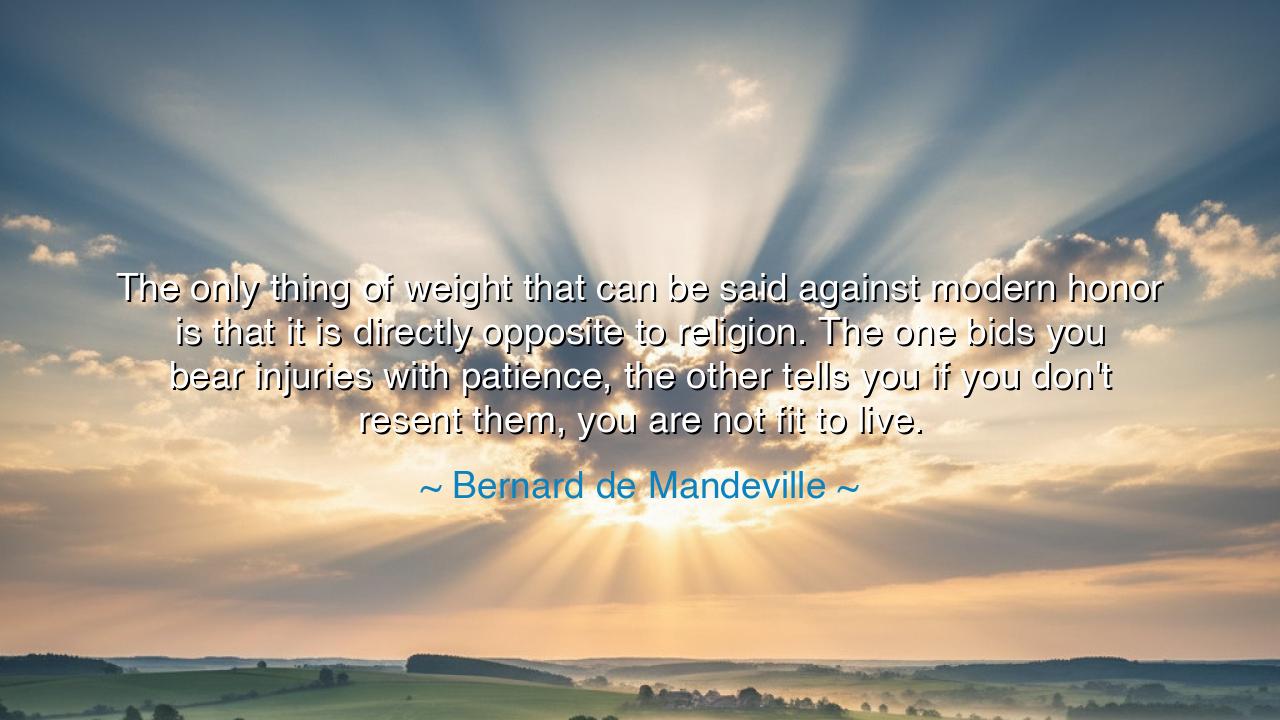
The only thing of weight that can be said against modern honor
The only thing of weight that can be said against modern honor is that it is directly opposite to religion. The one bids you bear injuries with patience, the other tells you if you don't resent them, you are not fit to live.






Hear the words of Bernard de Mandeville, sharp as a double-edged blade: “The only thing of weight that can be said against modern honor is that it is directly opposite to religion. The one bids you bear injuries with patience, the other tells you if you don’t resent them, you are not fit to live.” In this paradox, he unveils a truth that pierces the heart of human society: that the laws of heaven and the laws of men are not always the same, and that the path of pride often wars against the path of humility.
When Mandeville speaks of modern honor, he names the code of men—pride, reputation, vengeance, the fiery demand that no insult be endured without answer. This kind of honor is the seed of duels, the fuel of wars, the spark that ignites when pride is touched. To live by this honor is to guard one’s name as more precious than life itself. Yet he contrasts it with religion, which calls men not to strike back but to forgive, not to shout but to endure, not to resent but to love even those who wound them. Here lies the eternal conflict: the call of the spirit versus the call of pride.
The instruction of patience is not weakness, but strength of a higher order. Religion has ever taught that to bear injuries without revenge is to be greater than the one who inflicted them. In the Sermon on the Mount, Christ declared, “Turn the other cheek.” The prophet Muhammad urged restraint, teaching that “the strongest among you is not the one who can subdue another, but the one who can control his anger.” In these sayings lies the path of true peace, though it demands the crushing of ego. But modern honor despises such restraint; it cries out that to endure an insult is worse than death, that the unavenged man is no man at all.
History is rich with examples of this conflict. In the age of dueling, nobles would risk their lives over the slightest slight—a glance, a word, a rumor whispered. Men of great talent were slain for nothing more than wounded pride, leaving families bereft and nations deprived. Yet at the same time, saints, sages, and reformers bore mockery, chains, and even execution without raising a hand in vengeance. Consider the life of Martin Luther King Jr., who suffered insult after insult, blow after blow, yet responded only with dignity and nonviolence. His strength was not in the sword but in the endurance of the spirit, and through it he reshaped the destiny of a nation.
Mandeville’s words reveal a tension that has haunted humanity in every age: shall we live by vengeance or by patience? By the laws of men or by the laws of heaven? To cling to honor is to preserve pride, but often at the cost of peace. To cling to religion’s call of endurance is to seem weak in the eyes of the world, yet strong before the eyes of eternity. Each soul must choose which master it shall serve.
The lesson is clear: beware of confusing pride with virtue. The world may cheer when you strike back, but the heavens honor the one who endures with grace. This does not mean surrender to injustice, for to resist evil is noble—but resistance need not be poisoned by resentment or chained to vengeance. True power lies not in the quick blade, but in the steadfast heart that acts from justice, not from wrath.
Practical action lies before you. When injured by words, do not let pride drive you into destruction; pause, breathe, and weigh whether response is needed at all. When insulted, ask whether silence may be stronger than reply. When wronged, seek justice if you must, but without hatred. Train your soul in patience, for it is a shield stronger than steel. For honor, if rooted only in pride, will fade like smoke; but patience, rooted in the eternal, will endure forever.
Thus Mandeville’s paradox stands: modern honor calls for vengeance, but religion calls for endurance. One defends pride; the other defends the soul. Choose wisely, for the path you walk will shape not only your life, but the legacy you leave behind. Let patience, not pride, be your strength.






AAdministratorAdministrator
Welcome, honored guests. Please leave a comment, we will respond soon